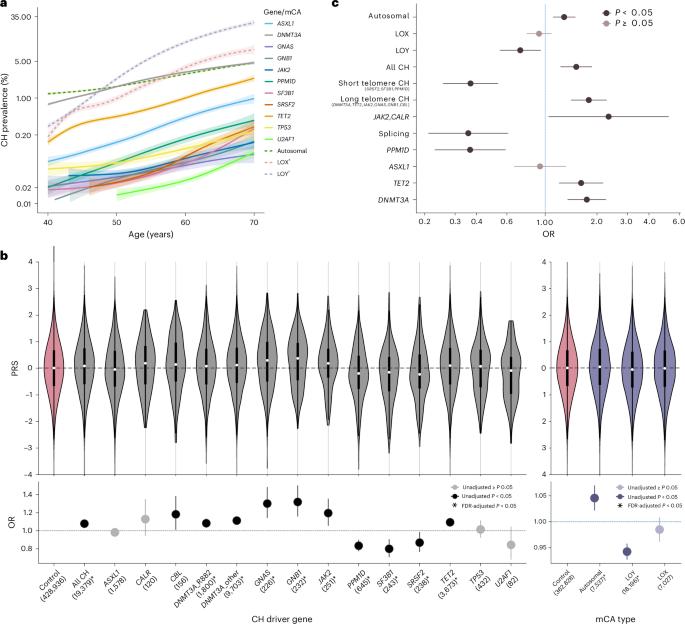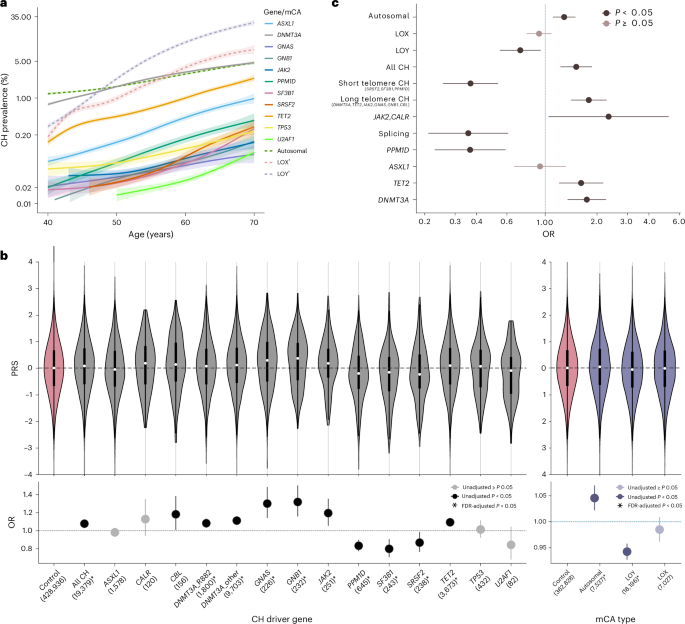Telomere attrition becomes an instrument for clonal selection in aging hematopoiesis and leukemogenesis
IF 29
1区 生物学
Q1 GENETICS & HEREDITY
引用次数: 0
Abstract
The mechanisms through which mutations in splicing factor genes drive clonal hematopoiesis (CH) and myeloid malignancies, and their close association with advanced age, remain poorly understood. Here we show that telomere maintenance plays an important role in this phenomenon. First, by studying 454,098 UK Biobank participants, we find that, unlike most CH subtypes, splicing-factor-mutant CH is more common in those with shorter genetically predicted telomeres, as is CH with mutations in PPM1D and the TERT gene promoter. We go on to show that telomere attrition becomes an instrument for clonal selection in advanced age, with splicing factor mutations ‘rescuing’ HSCs from critical telomere shortening. Our findings expose the lifelong influence of telomere maintenance on hematopoiesis and identify a potential shared mechanism through which different splicing factor mutations drive leukemogenesis. Understanding the mechanistic basis of these observations can open new therapeutic avenues against splicing-factor-mutant CH and hematological or other cancers. This study explores the relationship between telomere length and clonal hematopoiesis. Splicing factor and PPM1D gene mutations are more frequent in people with genetically predicted shorter telomere lengths, suggesting that these mutations protect against the consequences of telomere attrition.


端粒磨损成为衰老造血和白血病发生中克隆选择的工具
剪接因子基因突变驱动克隆造血(CH)和髓系恶性肿瘤的机制,以及它们与高龄的密切关系,目前尚不清楚。本研究表明,端粒维护在这一现象中起着重要作用。首先,通过对英国生物银行454,098名参与者的研究,我们发现,与大多数CH亚型不同,剪接因子突变的CH在遗传预测端粒较短的人群中更为常见,PPM1D和TERT基因启动子突变的CH也是如此。我们继续表明,端粒磨损成为老年克隆选择的工具,剪接因子突变从关键端粒缩短中“拯救”造血干细胞。我们的研究结果揭示了端粒维持对造血的终身影响,并确定了不同剪接因子突变驱动白血病发生的潜在共享机制。了解这些观察结果的机制基础可以为剪接因子突变的CH和血液学或其他癌症开辟新的治疗途径。
本文章由计算机程序翻译,如有差异,请以英文原文为准。
求助全文
约1分钟内获得全文
求助全文
来源期刊

Nature genetics
生物-遗传学
CiteScore
43.00
自引率
2.60%
发文量
241
审稿时长
3 months
期刊介绍:
Nature Genetics publishes the very highest quality research in genetics. It encompasses genetic and functional genomic studies on human and plant traits and on other model organisms. Current emphasis is on the genetic basis for common and complex diseases and on the functional mechanism, architecture and evolution of gene networks, studied by experimental perturbation.
Integrative genetic topics comprise, but are not limited to:
-Genes in the pathology of human disease
-Molecular analysis of simple and complex genetic traits
-Cancer genetics
-Agricultural genomics
-Developmental genetics
-Regulatory variation in gene expression
-Strategies and technologies for extracting function from genomic data
-Pharmacological genomics
-Genome evolution
 求助内容:
求助内容: 应助结果提醒方式:
应助结果提醒方式:


